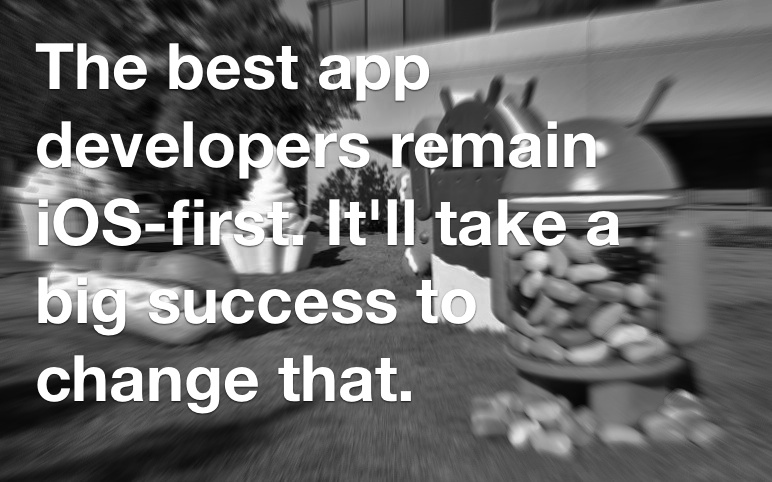Why Android desperately needs a billion dollar success story: The best new apps are all going iPhone-first
Why startups are all going iPhone-first
There’s been a number of articles over the last year that reiterate a simple fact: The best new apps are all going iPhone-first. Here’s three popular articles on this topic over the last few months:
- iOS First. Android Much, Much Later (Aug 2014)
- The Fallacy of Android-First (Apr 2014)
- Why Android First is a Myth (Oct 2013)
At this point, going iPhone-first is a widely held best practice. It’s our generation’s version of “Nobody ever got fired for buying IBM.” While there’s some debate on the margins on how quickly you should follow up with an Android app, certainly no one is arguing for Android-first (meaning, don’t do iPhone). There’s a number of reasons for this consensus, which the above articles thoroughly explain- here’s the superset of the reasons they give.
- Device fragmentation – both OS versions, carrier/handset add-ons, and hardware itself
- Less advanced, less stable tools and documentation
- Larger install base, but smaller addressable market (Feldman states that a 50% market share really translates to 12% if you support the most recent versions of Android, versus 30% for iPhone)
- Less valuable audiences on Android, losing ground in the US in key demos
- Cheaper iPhones may steal marketshare from Android in the future
- Higher cost of development for Android (2-3X claims Steve Cheney)
- $800k-$1.2M seed rounds leading to a “all-in on one platform” strategy
Note, I’m not saying I agree with above, just summarizing what’s been said.
In addition to this, I’d also like to add a couple more human aspects of the decision:
- Many/Most startup founders and employees are Steve Jobs fanboys, carry iPhones, and want to design for themselves
- Their friends carry iPhones, and they want to make something for their friends
- There’s more hipster designery mobile developers who build for iPhone, and that’s the supply-side of talent in SF Bay Area
- Investors (other than Bubba Murarka) usually carry iPhones, so it’s easier to pitch to them
- More tech press outlets want to cover iPhone-specific news
Whether you agree if the above is sane or not, the reality is, there’s a lot of friction to going against the norms. In order for a whole class of developers to move en masse to the Android platform is going to require a big carrot. I’m going to argue that this big carrot is going to be that the best developers, the ones who are investing $1M+ into a single app, need to feel like there’s such a huge opportunity in Android that they can’t miss out.
What Android can learn from Microsoft Windows
This consensus towards iPhone-first is happening at a critical time for Android. In many ways, the platform has been a huge success, and many who lived through the Windows vs. Mac years could make some interesting comparisons.
Here’s a stab at it- here’s some of the key reasons why Microsoft Windows won:
- Cheaper
- Ubiquitous
- More open
- Better penetration into the workplace
- Lots of applications that were exclusive to the platform
I’d argue that on almost all the point above, Android has achieved the same success as Windows. It’s cheaper, there’s more devices sold, it’s more open. But a critical component, of having more apps, isn’t there. Remember how there was always some key games that’d run on Windows that wouldn’t exist on Mac? Or how there were a bunch of business applications that would only run on Windows? That meant that the Windows platform had the virtuous cycle between developers and users to drive total domination.
But Android is not Windows. When you look at the current mobile ecosystem, iPhone has more apps. It has better apps. It gets the designery, well-funded startups to build iPhone-first.
Consumers and developers, together, will continue to choose the iPhone until that network effect is broken.
Today, Android is merely playing catchup – every time there’s a proprietary iPhone app, soon thereafter, they’ve done a good job convincing developers that they also need to release an Android app. Yet, to play to win, Android needs to convince many, many developers to create apps exclusively for their platform, just like Windows did a generation ago.
How does Google get there?
To me, the biggest thing that Google is lacking is a billion dollar tech startup story that’s exclusively about how Android is a better platform for developers. That story doesn’t exist, and as a result, people have focused more on the friction in going Android-first, rather than the opportunity.
IMHO, Android gets there by rewarding startups that are exclusively choosing its platform. I’m talking my book here, as I’m involved with a few Android-first products, but it’s also nevertheless from direct knowledge. Google should extensively feature apps that aren’t merely clones of iOS apps – it’s not enough to play catchup. Instead, Android should seek to really showcase apps that take advantage of very differentiated features and APIs. There should be a billion user success story around Android launchers and lock screens in the US, rather than acquihires/flips of Aviate, Emu, Cover, and others. These were solid companies led by good teams that wanted to go Android-first, but there was a missed opportunity in supporting them.
App store discovery for iOS is a glaring weakness. It’s editorially driven, and doesn’t give great new apps the chance to be successful, which is why four companies own 70% of the top apps – Google, Facebook, Yahoo, and Apple. They’ve created a winner-take-all environment, especially as Facebook has shown how to effectively use App Constellations to drive traffic between apps. Instead, Google could create a much more fluid ecosystem, which would reward and boost apps the way that search has driven traffic to millions of long-tail websites. Everyone does SEO because they know that yes, you can create a public company like Yelp, or a fast-growing startup like Genius, on the Google Search platform. There’s no story like this in mobile.
And yes, shifting installs from the “head” developers into the long tail might make it less attractive for some, but the biggest developers will always develop for both – they don’t have a choice. The battleground is for the hearts, minds, and product roadmaps of new, innovative apps that will drive adoption for their parent platform.
Android is an important platform, and it’s built more closely to the open nature of the internet, and so for that reason I’m rooting for it. But to make it the first choice for developers, it needs to do more than it is.
Do you work at Google?
Finally, if anyone at Google is reading this, email me: voodoo [at] gmail. Like I said, I’m happy to talk my book :)
I write a high-quality, weekly newsletter covering what's happening in Silicon Valley, focused on startups, marketing, and mobile.
Views expressed in “content” (including posts, podcasts, videos) linked on this website or posted in social media and other platforms (collectively, “content distribution outlets”) are my own and are not the views of AH Capital Management, L.L.C. (“a16z”) or its respective affiliates. AH Capital Management is an investment adviser registered with the Securities and Exchange Commission. Registration as an investment adviser does not imply any special skill or training. The posts are not directed to any investors or potential investors, and do not constitute an offer to sell -- or a solicitation of an offer to buy -- any securities, and may not be used or relied upon in evaluating the merits of any investment.
The content should not be construed as or relied upon in any manner as investment, legal, tax, or other advice. You should consult your own advisers as to legal, business, tax, and other related matters concerning any investment. Any projections, estimates, forecasts, targets, prospects and/or opinions expressed in these materials are subject to change without notice and may differ or be contrary to opinions expressed by others. Any charts provided here are for informational purposes only, and should not be relied upon when making any investment decision. Certain information contained in here has been obtained from third-party sources. While taken from sources believed to be reliable, I have not independently verified such information and makes no representations about the enduring accuracy of the information or its appropriateness for a given situation. The content speaks only as of the date indicated.
Under no circumstances should any posts or other information provided on this website -- or on associated content distribution outlets -- be construed as an offer soliciting the purchase or sale of any security or interest in any pooled investment vehicle sponsored, discussed, or mentioned by a16z personnel. Nor should it be construed as an offer to provide investment advisory services; an offer to invest in an a16z-managed pooled investment vehicle will be made separately and only by means of the confidential offering documents of the specific pooled investment vehicles -- which should be read in their entirety, and only to those who, among other requirements, meet certain qualifications under federal securities laws. Such investors, defined as accredited investors and qualified purchasers, are generally deemed capable of evaluating the merits and risks of prospective investments and financial matters. There can be no assurances that a16z’s investment objectives will be achieved or investment strategies will be successful. Any investment in a vehicle managed by a16z involves a high degree of risk including the risk that the entire amount invested is lost. Any investments or portfolio companies mentioned, referred to, or described are not representative of all investments in vehicles managed by a16z and there can be no assurance that the investments will be profitable or that other investments made in the future will have similar characteristics or results. A list of investments made by funds managed by a16z is available at https://a16z.com/investments/. Excluded from this list are investments for which the issuer has not provided permission for a16z to disclose publicly as well as unannounced investments in publicly traded digital assets. Past results of Andreessen Horowitz’s investments, pooled investment vehicles, or investment strategies are not necessarily indicative of future results. Please see https://a16z.com/disclosures for additional important information.

